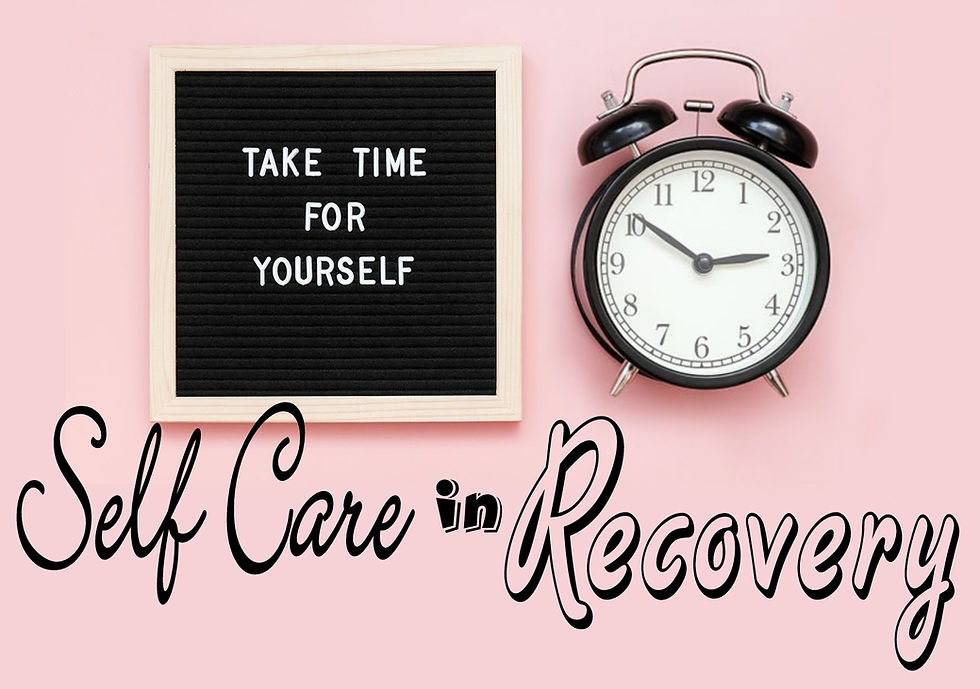Self Care In Recovery
- Anna Torday
- Jan 9, 2023
- 4 min read

Why Self-Care is Important in Addiction Recovery?
Addiction and substance abuse disorders are quick to take over your life and everything that’s important to you. When you’re in active addiction, drugs and alcohol become your main priority, and the importance of things like physical and mental health, work, school, and family gets drowned out by your need to not be sober.
Once you get sober, it can be incredibly easy to get caught up in the chaos of daily life, and forget that taking care of yourself is not an option, but a priority. Taking care of yourself sounds like an easy and simple task, but the reality is that most people struggle to find healthy ways to take care of themselves, whether they’re in recovery or not.
What is Self-Care?
The idea of self-care doesn’t have to be overwhelming or scary, though it definitely can be at first. In today’s culture, self-care is often thought to be taking a long bath or treating yourself to a new clothing item, but it’s so much more than that. Self-care is different for everyone, and can look like a variety of different things.
For some, self-care will be doing the dishes after coming out of a depressive episode, for others, it will be buying a ticket to see a movie after a stressful week. Self-care looks different for everyone, and that’s okay.
Taking Care of Yourself is Not Selfish
✨️5 Tips For Caring For Yourself✨️
1. Stay Mindful
You hear a lot about mindfulness in recovery, but what does being mindful really mean? Mindfulness is the practice is being aware of physical and mental sensations. Staying in the present moment can be difficult, and even uncomfortable at times. Sticking with the thoughts and feelings you’re experiencing in the moment gives you a chance to get in touch with what’s really going on inside you, and allows you to explore emotions and thoughts that you avoided when you were in active addiction.
2. Connect With Other People in Recovery
Addiction, depression, anxiety, and other mental health conditions all thrive in solitude. In order to prevent a relapse and combat symptoms of poor mental health, it’s important to find people and groups that will build you up in your recovery and provide you with the support you need to stay sober.
Going to 12 step-based meetings like Alcoholics Anonymous or Narcotics Anonymous are great ways to connect with people and to find some encouragement throughout the day. If you don’t feel like you benefit from 12 step meetings, there are other sobriety-based community meetings like Refuge Recovery and SMART Recovery. They even offer online meetings!
3. Find Balance in Your Life
As a society, we tend to place a lot of value on the things that you do. We equate busy-ness with how good, productive, and valuable we are. However, this is a destructive and dangerous mindset to those who are the early stages of recovery
When you first begin to journey to sobriety, it can be extremely easy to spend all your time doing one activity, in an attempt to keep yourself distracted and avoid the temptation to use drugs or alcohol.
Finding a healthy balance between work, school, social life, and recovery activities like 12 step meetings can be tricky, but is possible. All of these things can be fulfilling, but if you’re focusing too much on one aspect of your life, you’ll quickly find yourself feeling overwhelmed, which could quickly lead to a relapse.
4. Take Time to be With Yourself
It can be extremely comforting to surround yourself with people 100% of the time, but that’s also not a realistic way to live your life. So, while connecting with other people is important, it’s equally as important to take time to just be with yourself. You are a completely different person when you’re using versus when you’re sober, and while at first it can be challenging to be alone, time alone will eventually become time that you value.
Spend a few hours a week learning who you are when you’re sober, exploring new places, discovering new activities or things that you like, finding new music to listen to, or expressing yourself through visual arts or other means.
5. Set Healthy Boundaries
Before getting sober, you probably had a group of people you spent a lot of time with that either encouraged your drug and alcohol use, or used with you. When you make the decision to get sober, it can affect the relationships you have with those people. As difficult as it is, cutting off communication with these people is going to help you resist the temptation to go back to using your drug of choice.
Self-care is about protecting yourself and your sobriety. Being open about the fact that you’re living a sober lifestyle is important because it lets people around you know that you aren’t going to be drinking or using drugs with them anymore.
Setting boundaries regarding who you spend time with, where you go, and what you do will help you avoid situations that could set you up for a relapse. In sobriety, you’ll have plenty of opportunities to form new relationships with people who are also in recovery!




Comments